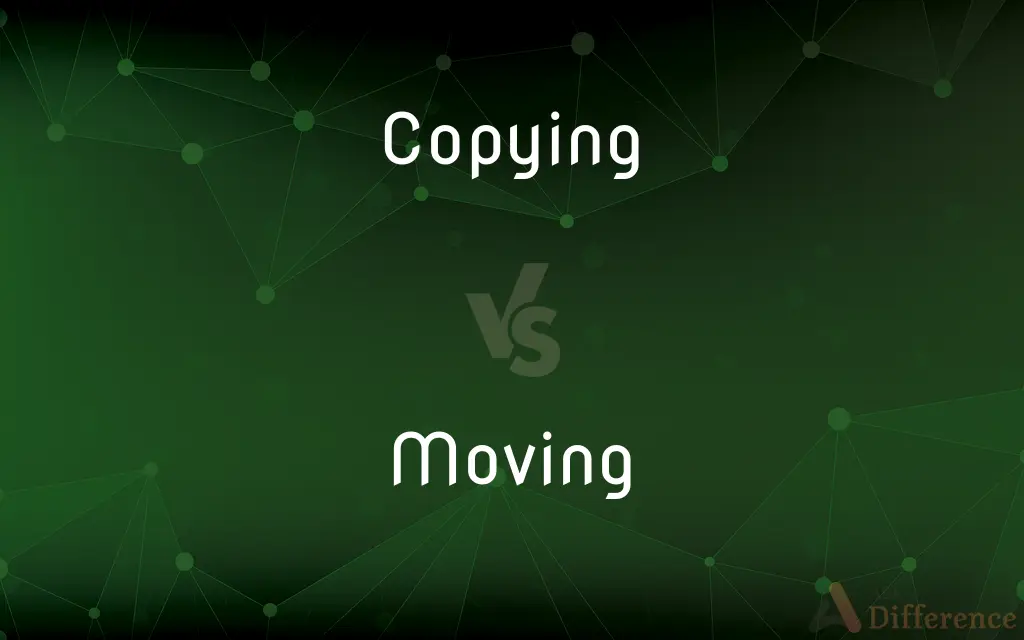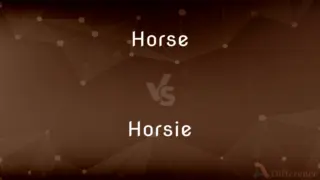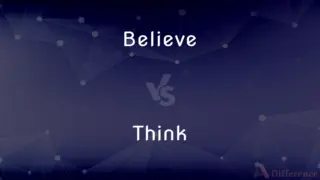Copying vs. Moving — What's the Difference?
By Tayyaba Rehman — Updated on September 21, 2023
Copying creates a duplicate, leaving the original intact. Moving relocates the original without leaving a duplicate.

Difference Between Copying and Moving
Table of Contents
ADVERTISEMENT
Key Differences
Copying and Moving are two processes often encountered, especially in the digital realm. Copying refers to the action of creating an identical replica of something without altering the original. Moving, on the other hand, refers to transferring or relocating something from its current position to another without creating a duplicate.
In the context of files on a computer, Copying means generating a duplicate of the file in a new location while retaining the original. Moving, in this scenario, means that the file is relocated to a new position, and it no longer exists in its initial location.
While both Copying and Moving can serve similar purposes, they have inherently different outcomes. Copying results in two versions of the same thing, which can be useful for backup or sharing. Moving, conversely, ensures that only one version exists, optimizing space and preventing redundancy.
One should be cautious when deciding between Copying and Moving. If one desires to have the same data in two places, Copying is the best choice. However, if the intent is to change the location without redundancy, Moving should be the action of choice.
In broader contexts, Copying could mean replicating actions, behaviors, or ideas, while Moving could signify progression, change, or physical relocation. Yet, in essence, Copying always involves duplication, and Moving centers on relocation.
ADVERTISEMENT
Comparison Chart
Outcome
Results in duplication
Results in relocation without duplication
Presence of Original
Original remains unaltered
Original is removed from its initial location
Purpose
Backup, sharing, replication
Optimization, change in position, prevention of redundancy
In Digital Context
Two versions exist post-process
Only one version exists post-process
Broader Context
Replicating actions, behaviors, ideas
Progression, change, physical relocation
Compare with Definitions
Copying
Reproducing something to create an identical version.
She's copying the document for the meeting.
Moving
Going or causing to go from one place to another.
They are moving to a new city next month.
Copying
Transferring information from one medium to another.
Copying the text from the website is prohibited.
Moving
Changing position or direction.
The moving clouds made patterns in the sky.
Copying
Making a product similar to another.
Many brands end up copying popular designs.
Moving
Progressing or advancing something.
We're moving the project to its next phase.
Copying
Recreating a specific look or feel.
The artist is copying the Renaissance style in his painting.
Moving
Eliciting a strong emotional response.
The movie was deeply moving and brought tears to my eyes.
Copying
Emulating someone's behavior or style.
He was accused of copying his classmate's homework.
Moving
Changing or capable of changing position
A moving target.
Copying
Copying is the duplication of information or an artifact based on an instance of that information or artifact, and not using the process that originally generated it. With analog forms of information, copying is only possible to a limited degree of accuracy, which depends on the quality of the equipment used and the skill of the operator.
Moving
Relating to or involved in a transfer of furnishings from one location to another
Moving expenses.
Moving van.
Copying
An imitation or reproduction of an original; a duplicate
A copy of a painting.
Made two copies of the letter.
Moving
Causing or producing motion.
Copying
(Computers) A file that has the same data as another file
Stored on the server a copy of every document.
Moving
Involving a motor vehicle in motion
A moving violation.
Copying
One example of a printed text, picture, film, or recording
An autographed copy of a novel.
Moving
Arousing or capable of arousing deep emotion
A moving account of the tragedy.
Copying
Material, such as a manuscript, that is to be set in type.
Moving
(not comparable) That moves or move.
Moving pictures
Copying
The words to be printed or spoken in an advertisement.
Moving
That causes someone to feel emotion.
Copying
Suitable source material for journalism
Celebrities make good copy.
Moving
Present participle of move
Copying
To make a reproduction or copy of
Copied the note letter for letter.
Copied the file to a disk.
Moving
(uncountable) The relocation of goods
Copying
To follow as a model or pattern; imitate.
Moving
(countable) A causing of a movement
The rats' movings are willed movements.
Copying
To include as an additional recipient of a written communication
Please copy me when you reply to her.
Moving
Changing place or posture; causing motion or action; as, a moving car, or power.
Copying
To make a copy or copies.
Moving
Exciting movement of the mind or feelings; adapted to move the sympathies, passions, or affections; touching; pathetic; as, a moving appeal.
I sang an old moving story.
Copying
To admit of being copied
Colored ink that does not copy well.
Moving
The act of changing place or posture; esp., the act of changing one's dwelling place or place of business.
Copying
To hear clearly or understand something said by radio communication
Mayday. Do you copy?.
Moving
In motion;
A constantly moving crowd
The moving parts of the machine
Copying
Present participle of copy
Moving
Arousing or capable of arousing deep emotion;
She laid her case of destitution before him in a very moving letter
Copying
(countable) an instance of the making of a copy
Moving
Used of a series of photographs presented so as to create the illusion of motion;
Her ambition was to be in moving pictures or `the movies'
Copying
(uncountable) the practice of making one or more copies
Moving
Initiating action or activity.
The coach said, Let's get moving!
Copying
An act of copying
Common Curiosities
Is moving always about physical relocation?
No, moving can also refer to progression or change, not just physical relocation.
In a digital context, which process helps in conserving space?
Moving conserves space as it prevents redundancy by not leaving a duplicate.
Can moving elicit an emotional response?
Yes, "moving" can also describe something that stirs emotions, like a moving speech.
Is the original file deleted when copying on a computer?
No, copying leaves the original file intact.
Does copying always mean replicating exactly?
While copying aims to replicate, in some contexts, it might mean emulating or being inspired by something without being exact.
Can moving be used in the context of promoting something?
Yes, you can "move" an idea or product by promoting or advancing it.
Does Copying always create a duplicate?
Yes, copying inherently results in a duplicate of the original.
What happens to the original file when moving?
When moving, the original file is relocated and no longer exists in its initial location.
Can copying be applied to behaviors or actions?
Yes, copying can mean emulating someone's behavior, action, or style.
If I want backups, should I copy or move?
For backups, you should copy to retain the original and have a duplicate as a safeguard.
Why would someone choose moving over copying?
Moving is chosen when the intent is to change location without leaving a duplicate, optimizing space.
Is copying always permitted?
No, copying can sometimes breach copyright or intellectual property rights.
Can moving signify progress in a task?
Yes, moving can denote progression or advancement in a task or project.
If I move a file to a USB and remove it, is the file lost?
No, if you've moved a file to a USB, it resides on the USB unless deleted.
Share Your Discovery

Previous Comparison
Horse vs. Horsie
Next Comparison
Believe vs. ThinkAuthor Spotlight
Written by
Tayyaba RehmanTayyaba Rehman is a distinguished writer, currently serving as a primary contributor to askdifference.com. As a researcher in semantics and etymology, Tayyaba's passion for the complexity of languages and their distinctions has found a perfect home on the platform. Tayyaba delves into the intricacies of language, distinguishing between commonly confused words and phrases, thereby providing clarity for readers worldwide.














































